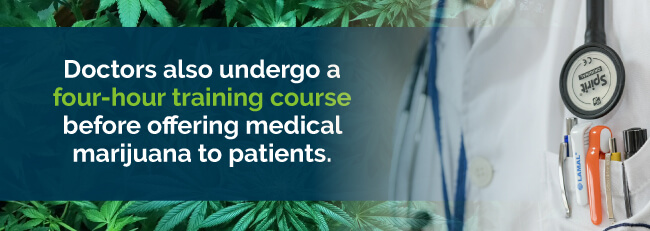
As 2017 pushes forward, so does Pennsylvania’s Department of Health, which is developing the state’s Medical Marijuana Program for a 2018 release. So far, the department has built its Medical Marijuana Physician Workgroup, as well as opened and reviewed applications for growers, dispensaries and labs.
The department’s latest step is the release of temporary regulations for doctors interested in helping patients through medical pot. The released regulations detail how physicians register and qualify as a medical marijuana practitioner, as well as how they issue patient certifications or prescriptions for medical pot.
Pennsylvania’s temporary regulations offer essential information for doctors interested in prescribing medical marijuana, as well as insight into the state’s approach to regulating practitioners.
Per the regulations, to register as a medical marijuana physician, doctors must:
The registration application requires several pieces of information and supporting documentation, which includes:
The Department of Health prohibits approved practitioners from several actions, including:
Doctors approved as medical marijuana practitioners do not have to file for renewal. They remain active until one or more of the following events:
Physicians are free to reapply after they’ve resolved either of the above causes for dismissal. If they’ve received disciplinary action, however, they must document and prove the issue has reached a resolution. The inclusion of evidence doesn’t guarantee a doctor will be recertified, though.
The temporary regulations proposed by Pennsylvania’s Department of Health affect physicians and patients in different ways.
Registered doctors, for example, are required to review the Prescription Drug Monitoring Program before issuing or modifying a medical marijuana prescription. The purpose of the program is to ensure the prescribed medical weed interacts with any other controlled substances prescribed to the patient in a positive way, which prevents the possibility of an adverse reaction.

Doctors also undergo a four-hour training course before offering medical marijuana to patients. The course includes:
The Department of Health plans to offer the course through approved training providers, which will be listed on the department’s website. The state boards of medicine, osteopathic medicine, pharmacy and nursing will all adopt the course as a continuing education credit as well.
How these regulations affect patients is by providing them with safety and security, as well as the knowledge that their doctor is educated and trained in medical marijuana. The state is more than approving doctors — it’s ensuring they have the knowledge to offer quality care to those in need.
An added benefit is the state’s commitment to checking and maintaining its set of registered doctors. Each year, the Department of Health plans to review each registered practitioner. The review will verify the status of the physician’s medical license and any disciplinary action in the last year. Yearly evaluations allow Pennsylvania to maintain a list of qualified and licensed doctors for patients across the state.
Specific regulations that will affect patients include the issuing and modifying of patient certifications. Per the temporary regulations, doctors cannot write a medical marijuana prescription lasting more than one year. Prescriptions are also only modifiable every 30 days, though doctors can change them sooner by contacting the Department of Health.
Each of these regulations encourages patients to continue seeing their physician on a regular basis, as well as talk to their doctor about possible prescription adjustments to develop a dosage that works for their symptoms.
Pennsylvania’s continued development of its Medical Marijuana Program reveals the state’s commitment to releasing a program that is safe, reliable and trustworthy. Its regulations for medical weed practitioners emphasize that goal further, as the requirements demand an active medical license in good standing.
Other regulations, such as the practitioner prohibitions and required training, all contribute to the state’s goal of producing a program that’s aligned with everyday health care, which promotes the fact that marijuana is a medicine that helps patients find relief from pain that isn’t alleviated by pharmaceutical drugs.
The investment by Pennsylvania to develop its Medical Marijuana Program suggests the program’s 2018 launch will be successful. Its success and integration with health care could encourage more Pennsylvanians to consider a medical pot prescription as a natural remedy for chronic pain or other illnesses. Trained and educated practitioners may also recommend marijuana prescriptions to their existing patients, who may benefit from the natural medicine.
We help patients discover and connect with licensed and certified medical marijuana physicians in their area. It’s a quick and easy way for you to find a practitioner that’s educated, caring and passionate about helping you reach relief from your daily pain and discomfort.
Find a compassionate medical marijuana physician in Pennsylvania, or in nearby states where medical pot is legal, by using our comprehensive doctor search services.
No Information on MarijuanaDoctors.Com should be used to diagnose, treat, prevent or cure any disease or condition. You can view our Full Disclaimer here.